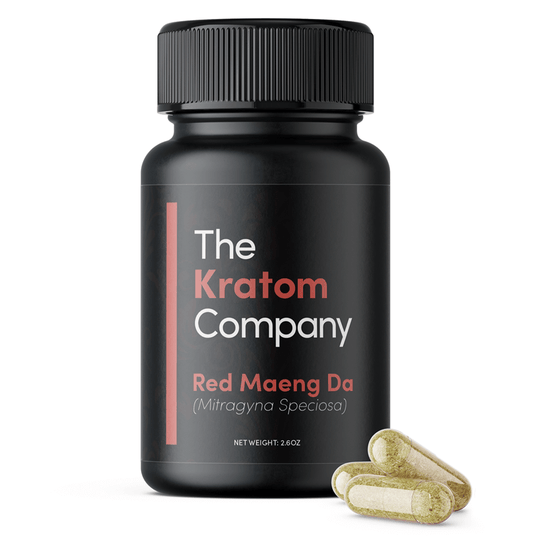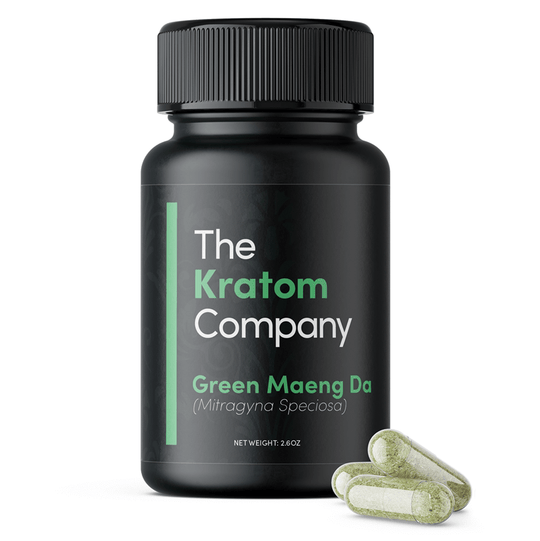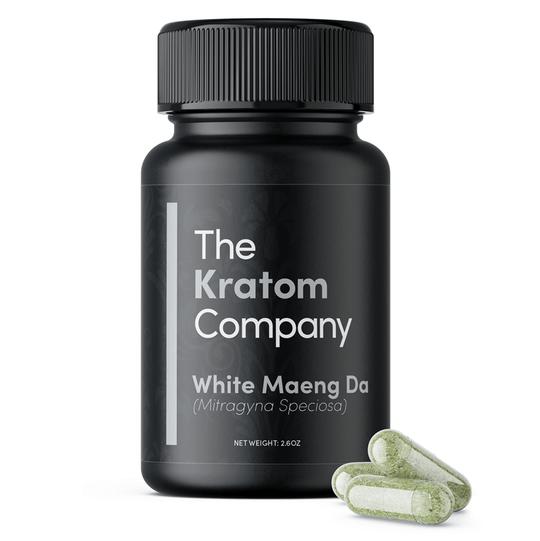
Now Might Be a Good Time To Quit 7OH: The FDA Recommendation & How To Get Off 7OH
Key Takeaways:
- The FDA is targeting potent, synthetic 7OH concentrates due to safety risks, not the natural kratom leaf.
- For those quitting 7OH, users report that natural kratom offers a more balanced alternative.
- When buying kratom products, always choose vendors that provide lab results to prove composition and potency.
There are many valid reasons people turn to 7-hydroxymitragynine (7OH). Despite these reasons, it’s important to understand the risk of using something that is synthetic or modified from its natural state and unregulated, especially something as potent as 7OH.
The Food and Drug Administration (FDA) is so concerned about the dangers of abuse and addiction that it wants to classify 7OH as a Schedule I controlled substance. This would make the substance illegal to manufacture, distribute, or possess. The FDA is not alone in its desire to classify 7OH products; the Drug Enforcement Agency (DEA) is backing its recommendation.
So, for many users, this means quitting 7OH is now an urgent consideration. The DEA, if it considers 7OH an imminent threat to public safety, could approve an emergency scheduling to avoid a lengthy rulemaking process. This would make 7OH illegal relatively quickly, but temporarily (two to three years). That said, this temporary measure strongly suggests that more permanent legislation would follow.
Let’s delve a little deeper into the FDA’s official warning, its concerns, and how it may affect those who use 7OH. Then, we’ll examine the critical difference between 7OH concentrates and natural kratom products, ultimately exploring a possible pathway for getting off 7OH altogether.
Understanding the 7OH Scheduling Timeline: Two Paths Forward
To be clear, the FDA is not focused on natural kratom leaf products. The only target of its recommendation is highly potent, synthetic 7OH concentrates, which is why quitting 7OH now is a good idea. The classification of 7OH as a Schedule I substance would put it in the same category as LSD and heroin.
If the DEA, which is responsible for setting federal rules on illicit substances, determines 7OH is an imminent threat to public safety, it has the authority to approve an emergency scheduling. This could happen any day, but the effect is temporary and is likely only a precursor to a total federal ban.
The DEA could take a more diplomatic approach, adhering to procedures and standard rulemaking processes. But this approach can take years. With the FDA painting a stark picture, it likely won’t take that long, so getting off 7OH should be a priority.
Understanding the FDA’s Target: Why 7OH Concentrates Are Under Scrutiny
Some 7OH users don’t understand the problem or why quitting 7OH is recommended. They only see 7OH as an alkaloid of the Mitragyna speciosa leaf. They emphasize its natural state, suggesting that it cannot be that bad.
Granted, naturally occurring 7OH exists only in very small, trace amounts, and it is only one of many alkaloids in the plant’s profile. The problem stems from 7OH concentrates or synthetics which are the focus of the FDA warning.
The Altered Product and Potency

See, synthetic or highly concentrated extracts boost 7OH levels far beyond what is found in the natural leaf. These unnatural levels present addiction and abuse risks because of the way the substance acts on the brain. 7OH concentrates work as opioid agonists, acting on the brain the same way as morphine, but many times more potent.
In its concentrated form, 7OH can lead to dependence, both physical and psychological. Users often express cravings and withdrawal symptoms (similar to opioid withdrawals) when they try quitting 7OH. And, the sad truth is, the extreme potencies can lead to overdose risks.
The Unregulated Market
The risks that concern the FDA stem from an unregulated market. Without the proper regulation, you can essentially say goodbye to quality control, which leads to mislabeling. For example, some 7OH products might falsely tout claims like “100% safe and natural” when in reality they are synthetics containing unnatural and potentially unsafe amounts of the extract.
For those getting off of 7OH, it’s essential to have regulated markets. They need to be able to rely on labels with accurate dosage and potency ratings. The FDA recommendation means the current market will receive the oversight it likely needs, resulting in mandatory testing, dosage controls, and purity standards.
A Possible Alternative
Many people quitting 7OH are turning to natural kratom strains. The plant-based products are often described as providing a more balanced, multi-faceted feeling than 7OH concentrates, which typically provide a singular, more intense experience that users sometimes describe as overwhelming. The beauty of this transition is that organic kratom products only contain trace amounts of 7OH, making them much safer. Also, the kratom leaf is not the target of FDA concern.
The current recommendation and regulatory focus is on potent, synthetic 7OH concentrates, not the natural kratom leaf. In fact, the Department of Health and Human Services explicitly stated that the FDA’s action “is not focused on natural kratom leaf products.” The distinction is critical because naturally occurring 7OH exists only in very small, trace amounts within the plant’s profile.
That’s why, when quitting 7OH, many are turning to natural kratom products. The minimal presence of 7OH and its combination with several other alkaloids, means the plant offers a more balanced experience while reducing risks.
Interpreting Community Reports: A User-Described Path Away From 7OH
The FDA’s actions and the known risks of synthetic, high-potency products have encouraged many people to quit 7OH. But quitting 7OH isn’t that easy without an alternative. It’s important to remember that these people turned to this specific alkaloid for a reason.
The good news is that many users don’t like the intense feelings that come from unregulated 7OH and are in the market for something more balanced. A genuine product without the same high-potency dangers.
Many of our customers have reported that our kratom products have helped when they were getting off of 7OH. It’s important to note that this is not medical advice or the presentation of a cure, but a common review from our customers.
A “Full Spectrum” Theory
Based on customer reports, we can consider a “full-spectrum” theory, meaning the full spectrum of alkaloids in the natural leaf provides a more balanced user experience. This greater balance is likely what helps when quitting 7OH. It’s a pharmacological concept known as synergy and modulation, and it basically means the whole is greater than the sum of its parts.
In these products, you get the benefits of all the alkaloids in the natural kratom leaf. This is important because some of these minor alkaloids, even in small amounts, enhance and support the primary alkaloids. The synergistic interaction might help some alkaloids absorb better or prolong their presence in the body.
From synergy, we move to modulation. See, alkaloids tend to act as modulators or antagonists. The combination of alkaloids in the kratom leaf essentially creates a system of checks and balances. For example, one alkaloid in the kratom leaf might create a potent and stimulating feeling, while another has calming properties. The second doesn’t cancel out the effects of the first, but it buffers those effects, potentially reducing the risks of jitteriness or anxiety.
Quitting 7OH concentrates is challenging because they comprise a singular and potent alkaloid. There are no checks and balances. Organic kratom, alternatively, has over 50 alkaloids contributing to its profile and effects.
Navigating Your Choices Responsibly: How To Be a Safe Consumer

When getting off 7OH, it’s crucial to do your research, even when switching to kratom. Kratom is still largely unregulated federally, so there are still risks of mislabeling and misrepresentation. Some states do have regulations in place, while others have bans, so it’s essential to review your local laws before purchasing any kratom products.
Beyond checking the legality of kratom in your state, you want to ensure the products you buy are what they claim to be. You do this by reviewing any results of third-party lab testing. All of our products, from capsules to powders, are tested for purity and potency.
We specialize in kratom and focus on education and accuracy, not hype. Our goal is complete transparency with our customers. That’s why we never make any medical claims and always encourage those quitting 7OH or looking to try kratom extracts to seek proper medical advice from their doctor or a primary care physician.
Kratom Strains
If you’re getting off of 7OH and looking to kratom as a possible alternative, it’s important to understand the strains and their potential effects. For example, white vein is often associated with energy, focus, and mood enhancement. Red vein can have energizing or calming effects depending on the dosage. Finally, green vein is more often associated with the full-spectrum experience discussed earlier. You want to pick a vein that aligns with your goals.
Moving Forward Safely: Understanding Your Choices
With the FDA’s current warning and the DEA’s support, quitting 7OH concentrates is a growing concern among consumers. Our customers say that kratom is a potential alternative to these riskier synthetics. The FDA even specified that it’s not targeting the natural kratom leaf.
The Kratom Company doesn’t use synthetics and doesn’t isolate alkaloids from the natural leaf. We use only the best kratom farms from Southeast Asia for our products, ensuring they are all-natural. All our products also undergo rigorous lab testing to ensure purity. If you want to get off of 7OH and try something new, check out our selection of kratom online.
Featured Products
Explore More Posts







Leave a Reply